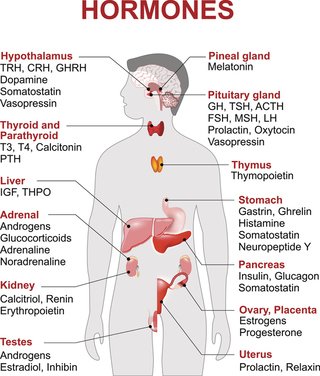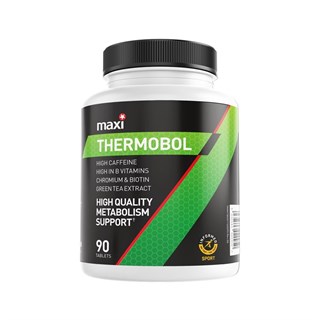The Endocrine System – Part 1
The Endocrine system could be described as your internal broadband network. It’s our biological messenger system that controls a number of glands and organs that balance hormonal levels. The release or control of these hormones affect nearly every process in the body, from emotion, sleep, fertility, blood pressure and many more. I’m Gareth Nicholas, MaxiNutrition Performance Nutritionist, and I would like to delve into the role and response of the endocrine system on weight management. Perhaps knowing more about the internal workings of your body, will help you find the best way to complement your training, diet and recovery.
Endocrine Hormones 101
To avoid turning this into a biology degree, I want to hone in on just a few of the endocrine hormones that play a role in weight management. This is by no means the full story, but hopefully a snap shot of some of the terms and processes, that feature in this complex system.


Hunger Hormones
- Cholecystokinin (CCK) – Produced in the small intestine (Duodenum), CCK is responsible for digestion and appetite. Based on the protein and fat content in the stomach, CCK is released to increase the feeling of fullness during eating, effectively telling the brain you’ve had enough. Research has shown that very obese people have low levels of CCK, which may well explain why losing weight can be difficult. Exercise appears to decrease CCK levels, which would make sense to facilitate and encourage energy replenishment.
- Leptin – Is a long term energy balance mediator produced from adipose tissue (fat), known as the “starvation hormone”. Primarily an assessor of energy stores, leptin tells the brain on the status of fat storage and promotes a change in your energy balance to maintain healthy fat levels. Leptin levels decrease as a result of exercise, severe calorie restriction (fasting) and reductions in body fat. All of which make the brain think that you are starving and switches on the ‘starvation mode’. You might think that obese individuals should have low leptin levels, to stop additional fat storage and encourage weight loss, but in fact the opposite is true. Overweight people tend to have high leptin levels but become leptin resistant, therefore the signals of high fat storage do not seem to reach the brain and thus promoting storage rather than reporting that stores a full.

- Ghrelin – Unlike leptin as a stimulant to weight loss, Ghrelin is considered the hunger hormone. As expected, exercise stimulates Ghrelin release and produces a meal-by-meal related response, rather than the long term changes observed in leptin levels. Ghrelin is believed to be responsible for the ‘hunger pangs’, reminding you that it’s time to eat. Reductions in body weight increases plasma Ghrelin levels, improving the hormonal sensitivity. Increases in Ghrelin, regulate growth hormone, insulin and glucose, as a means to supporting energy balance. Usually overweight individuals have lower Ghrelin levels compared to lean people, suggesting that ghrelin is not the reason for weight gain.

- GLP-1 (Glucagon-like peptide 1) – Another hunger and appetite hormone, known as an incretin. GLP-1 helps to decrease blood sugar levels by enhancing the secretion of insulin and inhibiting glucagon (glucose releasing hormone) release. In recent years, a GLP-1 agonist drug Semaglutide (GLP-1 mimic), has been lofted as the new weight loss wonder drug. Semaglutide (brand names: Ozempic, Rybelsus & Wegovy) have shown amazing results in lowering body weight in non-diabetic obese individuals. In fact, following a 68 week study, individuals average body weight losses where 15% versus 2% losses in a placebo control group that had all the same lifestyle interventions, minus the Semaglutide. Caution: Semaglutide should only be used in severe obese cases and is a lifelong commitment. Social media and Hollywood celebrities are already using this drug out of context for weight loss. Always consult with your healthcare practitioner before considering Semaglutide.

Don’t get hormonal about hormones
Reading through the complexities of our hunger and metabolic hormones, common themes emerge as to what we should, and shouldn’t do to support our endocrine system. You have probably seen a number of social media posts and influences talking about some of these hormones in isolation, but these hormones and systems do not work in isolation. Here are a few tips to help optimise your endocrine system:
- Eat a healthy balanced diet that supports your required daily calorie intake. Whilst fasting offers a number of potential benefits, particularly for individuals trying to lose weight, this dietary method may not suit everyone and can cause hormonal imbalances.
- Gut health - increase the fibre in your diet and decrease the free sugar. Eat a variety and range of foods. Try where possible to lower the reliance on processed foods and snacks.
- Sleep well - Create a good sleep routine. Rest is the time for recovery and adaptations to take place.
- Regular exercise - You should try to exercise for a minimum of 150 minutes per week. Mix up your exercise routines to include high intensity, cardiovascular and resistance exercise. Importantly make sure that exercise is fun to keep you motivated and staying active.
- Reduce your stress - Motivation, meditation, time-out, friends and family, are all great ways to boost your mood and lower stress levels. Our mental health is a hot topic and it’s about finding the right method for you. Healthy body, healthy mind and vice-versa.














